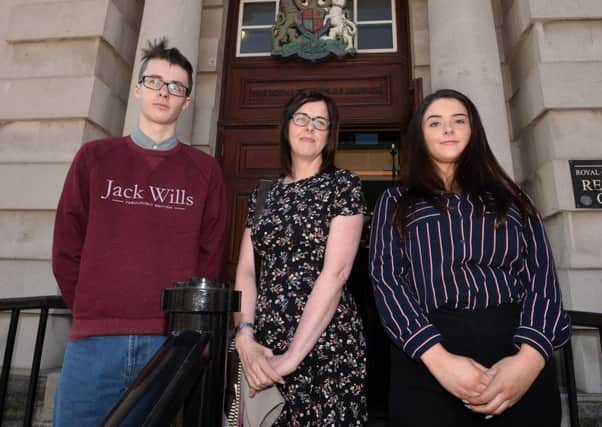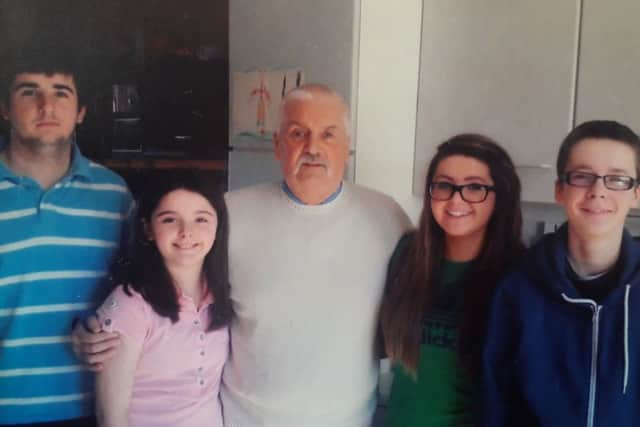Children punished by mother's denial of widow's payment, Supreme Court told


In a landmark legal challenge, counsel for Siobhan McLaughlin claimed she has suffered discrimination from an exclusion which has not been shown to encourage marriage.
Addressing Supreme Court justices sitting in Northern Ireland for the first time, Frank O’Donoghue QC insisted there was an obligation to provide the benefit to those in his client’s situation.
Advertisement
Hide AdAdvertisement
Hide AdHe said: “The court should require the state, as we prepare to enter the third decade of the 21st Century, to justify this obvious difference in treatment beyond a rather simplistic and rigid explanation that one widow was married and the other was not.”


It was also claimed the refusal has punished her children for matters beyond their control.
Ms McLaughlin, 46, from Armoy, lived with her partner John Adams for 23 years until he died from cancer in January 2014.
The couple had four children together, but never wed.
She was denied a bereavement payment and widow’s allowance because they were neither married nor in a civil partnership at the time of Mr Adams’ death.


Advertisement
Hide AdAdvertisement
Hide AdNow the sole provider for her family, Ms McLaughlin works as a special needs classroom assistant and cleaner.
In 2016 she won her original case before senior judges in Belfast overturned a finding that denial of the benefit was unlawful.
Now she is appealing their verdict in a bid to secure the same rights available to married couples.
Proceedings have been brought against the Department for Communities at Stormont.
Advertisement
Hide AdAdvertisement
Hide AdShe would have been entitled to the allowances under the Social Security Contributions and Benefits (NI) Act 1992 had she been married.
Ms McLaughlin’s lawyers claim the refusal amounts to unlawful discrimination and a breach of her private and family life entitlements under Article 8 of the European Convention on Human Rights.
If the Supreme Court backs her case it could set a precedent for bereaved cohabiting parents across the UK to receive payments.
With around 2,000 families currently losing out on the allowance, the cost for the government may run into hundreds of millions of pounds.
Advertisement
Hide AdAdvertisement
Hide AdAs the hearing got under way at the Royal Courts of Justice in Belfast, Lady Hale, president of the Supreme Court, described it as an “historic occasion”.
The five justices were told Mr Adams had made a promise to his own late wife that he would never remarry.
Lady Hale described those circumstances as commendable, but not strictly relevant to the legal issues being examined.
Arguing that Article 8 rights were in play, Mr O’Donoghue submitted: “It must provide the measure without discrimination.”
Advertisement
Hide AdAdvertisement
Hide AdInstead, he claimed, there was a difference in treatment between spouses and civil partners in an analogous bereavement situation.
“Where you have a cohabitee couple who decide to have a family and who live together for a lengthy period of time, and where they are clearly living together at the time of death, that is sufficiently similar to fall within this concept of a public undertaking having been given by these two committed people to each other and to the family unit,” he said.
“We say a more inclusive measure could have been used and should have been used – as a bare minimum an entitlement to the widowed parent’s allowance.”
According to counsel the denial was manifestly without reasonable foundation.
Advertisement
Hide AdAdvertisement
Hide AdHe insisted there was no proof to support the justification advanced of encouraging marriage.
“Where’s the evidence that this measure has resulted in any couple marrying who would otherwise have remained unmarried?” Mr O’Donoghue asked.
“This measure has been in existence over 25 years, and there’s no evidence the suffering caused to unmarried couples and their children by being excluded has caused any other couples to marry.”
He added: “The justification for the difference between the two positions, the exclusionary effect of the legislation, does not stand up.”
Advertisement
Hide AdAdvertisement
Hide AdIntervening in the case to back Ms McLaughlin’s legal fight, counsel for the Child Poverty Action Group claimed the denial treats her sons and daughters as less worthy.
Helen Mountfield QC insisted: “To condemn these children to receiving no state support for their father’s death, a financial hardship on top of emotional loss, was to penalise them for something which they are not responsible for.”
Responding for the department, Tony McGleenan QC, stressed the allowance was not a benefit for children.
“It’s described as a benefit for the survivor,” he said.
“The purpose of the widowed parent’s allowance was to allow women or, latterly, men, to have the support they need, take time off and then get back into the world of work.”
Advertisement
Hide AdAdvertisement
Hide AdMr McGleenan told the court UK law has conferred financial and social security advantages on those who are married – without breaching human rights law.
Since 1925 the British state has made provision for those who have lost their spouse through bereavement, he continued.
In the 93 years since the “bright line rule” for eligibility has been adopted and endorsed by successive governments and parliaments, he contended.
Counsel added: “The import of this case has ramifications far beyond this jurisdiction.”
Advertisement
Hide AdAdvertisement
Hide AdReserving judgment following closing submissions, Lady Hale told the parties: “It’s good to have had such an interesting and difficult case to be our first in this fine city.
“We shall now go away and work out what we think the answers may be.”